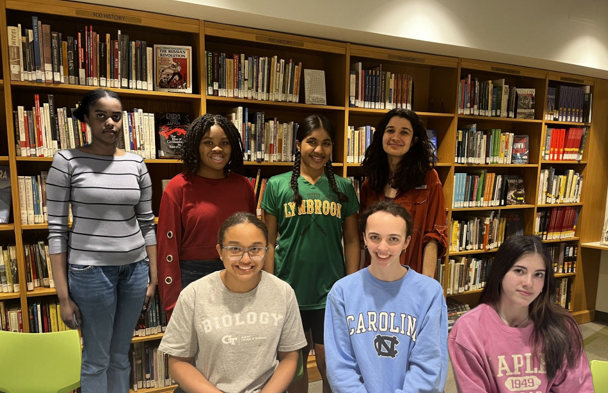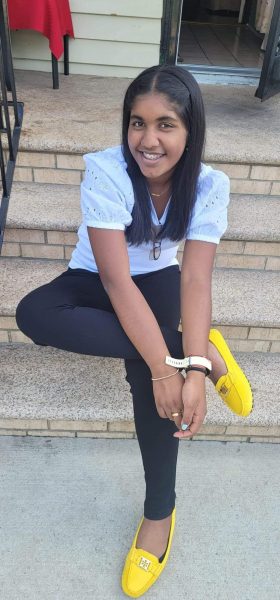Amongst the wide range of clubs and extracurriculars offered at LHS, Speech and Debate is one many students have yet to try. The half-year elective course is taught by Library Media Specialist Maureen Bertolini, who also advises the Speech and Debate club. Both the course and club aim to teach students argumentative and research skills, and help them improve their public speaking capabilities.
Bertolini became advisor of the club in 2019 after students from the Class of 2021 revived the “dormant” club, as she described. Since then, members meet on selected Tuesdays when Bertolini aids them in preparing for different types of debate events: model congress, extemporaneous, Lincoln-Douglas, public forum, radio broadcast, and impromptu – all of which students engage in through the club. Prior to the pandemic, many of these debates took place in-person; however, now many have transitioned to Zoom meetings. Preparation for each league varies; for model congress, participating debate teams are given a docket of resolutions (debate topics) that will be argued on the day of the debate. Students then typically have a few weeks to research and prepare. As for extemporaneous, debaters are given the topics 24 hours before the debate, which means preparation time is much shorter and a lot of thinking is done on the spot.
“Students sharpen many vital skills when they participate in debate such as research, argumentative writing, speaking to deliver arguments, and learning to question or defend arguments during cross examination,” Bertolini explained. “I enjoy teaching and advising because so often my students tell me that their knowledge of the world expands, and they appreciate knowing many points of view pertaining to a variety of topics,” she elaborated.
The current Speech and Debate board includes senior Presidents Alexandra Ioannou, Colette Doyle, Yasmine Afzali, and Isabella Martinez; junior Vice President Cassandra Levinson; and senior Secretary Chloe Singh. “Speech and Debate has helped me immensely in my public speaking skills. Participating in the model congresses has made me a better public speaker whether it be for a school presentation or even presenting at a research fair. It also has improved my research skills,” Doyle shared. Doyle has participated in the club all four years of her high school career, and she noted how it stood out on her college applications. “Many colleges see it as a beneficial club. It also stood out as I was able to become co-president of the club and be in the National Speech and Debate Honor Society. The skills I gained in Speech and Debate also helped me immensely in college interviews and in writing numerous college essays. [The] Speech and Debate club also became a common talking point in many of the college interviews,” she added.
As for the classroom setting, the course elective dives deeper into the art of debate and how to hone the appropriate skills to face competitors on the main stage (via the real world or evening Zoom debate events). Sophomore Tal Moskowtiz took the elective the first two quarters of this year and had a rewarding experience. “I enjoyed debating against my other peers in the class and having “arguments” about the topics. We were taught about different styles of debates, like extemporaneous. We made several speeches from the ethicalness of zoos to debating about the high school dress code,” he recalled. “During the course, I was considering becoming a lawyer because of how interesting it was and how Ms. Bertolini made the class exciting,” he added. Moskowitz noted his two favorite memories from the class were embarking on a field trip to the Central Islip Courthouse in December with Dr. Benedict Tieniber’s Business Law students, and “when Mr. Sarosy came in to listen to our debate on the LHS dress code, and we got to present our speeches to him.”
Junior Danielle Ramsammy had also taken the course her sophomore year and shared what she gained out of it: “I like the research and presenting aspect of this class because it gave me the opportunity to learn more about subjects I was already interested in. This class contains projects all about researching a certain topic and presenting that information to your peers, [which] taught me a lot about events and people that I can still recall to this day.” When asked to reminisce about her favorite memory from taking the course, Ramsammy shared, “My favorite memory from this course would probably be the very first debate that we did. Like everyone else, I was very new to the class and very nervous to present my argument. After presenting, I was congratulated and told that my argument was very good by both my partner and teacher. This not only made me feel confident in my work, but it also made me feel good about what I wrote and gave me hope that I’d be successful in all of the future class projects.” Ramsammy is one of the many students who takes this course and learns to overcome fears of speaking in front of others and gaining self-assurance when delivering dialogues.
In essence, whether students choose to take the Speech and Debate course or join the club, or perhaps even both, they are actively learning skills and retaining tools to help them long after their academic careers are over. Taking the half-year course will teach students significant research skills and how to utilize databases current college students are using. Joining the club provides students and future debaters with the opportunity to be inducted into the National Speech and Debate Association (NSDA) Honor Society, as they collect points at their debates (25 points needed to be inducted), and earn the cord at graduation.


















